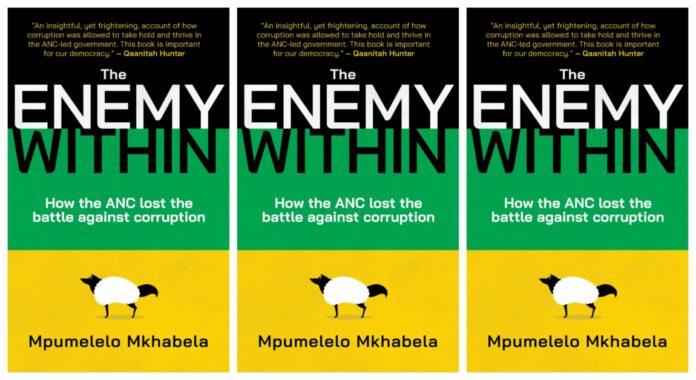Mpumelelo Mkhabela’s The Enemy Within: How the ANC lost the battle against corruption looks at the ruling African National Congress. Mkhabela who is a political analyst and News24 columnist looks at what happened inside the party over the past two decades. The Enemy Within tells a fascinating and gripping story, starting with Mandela, the Scorpions and Tony Yengeni all the way to Zuma and the Guptas to explain exactly how we got here.
An extract has been republished below with permission from the publishers.
The anti-corruption gospel according to Mbeki
During Mbeki’s administration, Parliament passed various pieces of legislation to combat organised crime and money-laundering and to beef up the management of public finances. Legislation was passed creating the much-respected Scorpions, a specialised unit tasked with investigating organised crime; it was later accused of a Hollywood-style approach to apprehending politicians caught feeding at the trough. The Public Finance Management Act, applicable to both national and provincial governments as well as state-owned enterprises, sought to tighten the management of public finances.

So did its companion piece of legislation for local government, the Municipal Finance Management Act. Of importance also was the attempt to create competitive bidding processes to prevent the manipulation of state procurement. In 2005, Mbeki told Parliament that his finance minister, Trevor Manuel, had persuaded his colleagues in cabinet to use the municipal finance legislation to prevent councillors from getting involved in the allocation of tenders.
The Mbeki administration also signed critical international instruments to combat corruption and money-laundering. These included the Southern African Development Community Protocol Against Corruption, the United Nations Convention Against Corruption, and the Organisation of Economic Co-operation and Development (OECD) Anti-Bribery Convention. What went wrong in Mbeki’s fight? Given the substantial attention Mbeki gave to corruption, the threat should have been tamed.
So, what went wrong? A lot went wrong in Mbeki’s analysis and actions against corruption. Both lacked sufficient power of example. It is worth illustrating the point about this particular weakness.
After Mwai Kibaki won Kenya’s presidency in 2002 by riding on a popular anti-corruption campaign, he appointed John Githongo, an official of the global anti-corruption agency Transparency International, as public sector ombudsman dedicated to fighting corruption. Early on in his new job in 2003, Githongo had wise words for Kenya’s new-broom president. “Sir,” he told Kibaki, “we can set up all the anti-corruption authorities we want, spend all the money we want, pass all the laws on anti-corruption, but it all depends on you. If people believe the president is ‘eating’, the battle is lost. If you are steady on this thing, if the leadership is there, we will succeed.”
RELATED:
Dear Jacob Zuma… a timeline
Githongo would later find himself in exile in Europe, fearing for his life. It didn’t take long
for the new broom in the presidency to become dirty itself. The eating frenzy was irresistible. Mbeki would have known about Kibaki’s disappointing performance in tackling corruption, for it was the first lady Zanele Mbeki who, at Kibaki’s inauguration ceremony, had expressed the hope: “The victory of the people of Kenya is a victory for all the people of Africa.” Perhaps his corruption was also a sign that countries like South Africa were too ambitious if they ever hoped their politicians would voluntarily renounce the corrupt spoils of political office.
The story of Kenya’s governance collapse under the weight of a corrupt leadership is documented in the appropriately titled book It’s Our Turn to Eat: The Story of Kenya’s Whistleblower. To be sure, except for rumours that he was the beneficiary of the hotelier Sol Kerzner’s largesse, an allegation which he felt had burned him, Mbeki has never faced allegations of corruption. In fact, he has actively theorised about it and campaigned against it. But his pre-emptive defence of corrupt officials and members of government, including Stella Sigcau, raises huge question marks.
Within his own party there was no unanimity about the problem. Even as he pontificated and theorised, drafted and signed anti-corruption laws and ratified treaties, his own comrades were hatching schemes to ‘eat’. Indeed, they were already eating. To adapt Githongo’s advice to Kibaki, Mbeki and the ANC needed to be counselled that “if people believe the governing party and its leaders are eating, the battle is lost”.
RELATED:
How Thabo Mbeki helped Robert Mugabe steal an election
In his pontifications about corruption, in official government events as deputy president and president, in Parliament and in international forums, Mbeki never once directly fingered the ANC as an enabler of corruption or its leaders as spreaders of the pandemic. Those who corrupted party processes for political gain were “not ANC” in Mbeki’s book. He did, however, speak of people who used their positions in the state to steal public resources. In speeches at ANC events, he characterised the battle for ANC positions as a battle to access state resources. But by failing to directly point a finger at specific ANC leaders known to be corrupt, and not emphasising enough in his analysis the importance of the power of example among ANC leaders, his otherwise noble battle against corruption fell short.
The book is published by Tafelberg – an imprint of NB Publishers. The book is available online and at all good bookstores.









